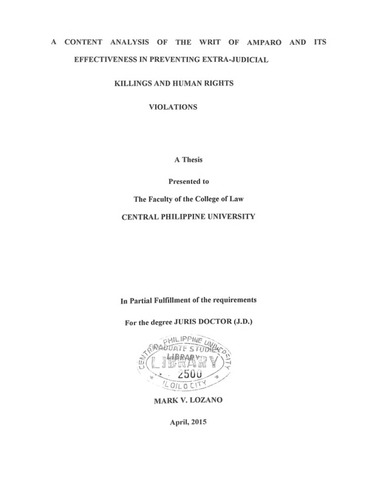A content analysis of the writ of amparo and its effectiveness in preventing extra-judicial killings and human rights violations
| dc.contributor.adviser | Alibogha, Salex E. | |
| dc.contributor.author | Lozano, Mark V. | |
| dc.date.accessioned | 2021-02-08T08:25:55Z | |
| dc.date.available | 2021-02-08T08:25:55Z | |
| dc.date.issued | 2015 | |
| dc.identifier.citation | Lozano, M. V. A content analysis of the writ of amparo and its effectiveness in preventing extra-judicial killings and human rights violations (Unpublished postgraduate thesis). Central Philippine University, Jaro, Iloilo City. | en_US |
| dc.identifier.uri | https://hdl.handle.net/20.500.12852/224 | |
| dc.description | Abstract only | en_US |
| dc.description.abstract | This study was conducted to determine the effectiveness of the writ of amparo in addressing the problem of killings and human rights violations. Further it aims to identify any discrepancy in the writ and its implementation and to discuss the possible frontiers that the writ may be fully utilized by the Philippine legal system. This is a qualitative study using content analysis research design. This study included news and editorial sections of three newspapers of general circulation in their online archive from 2007 up to the present namely, The Manila Bulletin, The Philippine Star and The Philippine Daily Inquirer since these were the focal areas of a newspaper that take on myriad issues including the writ of amparo. Further what were considered only were news articles and editorials that relates to the writ of amparo and its effectiveness and other key words pertaining to the same. There were a total of two hundred and sixteen (216) news articles initially found by the researcher when the key word “writ of amparo” was typed into the search bar of each newspaper website. Out of these it was found only that thirteen (13) articles which indicate effectiveness and five (5) articles indicating ineffectiveness. During the study, the researcher also found and noted emerging themes relating to positivism, defiance, expansion, and unanswered queries about the writ of amparo. A total of forty (40) articles were collected which tend to fit into the themes basing again on key adjectives or words as used in this study. These forty (40) articles were content analyzed to get the appropriate data. The themes used in this study are effective, ineffective, positivism, defiance, expansion, and unanswered queries. Articles for positivism obtained a total of twenty-four (24), defiance is six (6), expansion is one (1) and unanswered queries accounts for nine (9). These emerging themes were included because of their potential significance and impact on the study and for future studies. The results of this study supported the assumption that the writ of amparo is an effective tool in addressing extra-judicial killings and human rights violations. The data shows to indicate that the writ is effective from the perception of the subjects of this study. And further the study showed the possibility of studying whether the writ could be possibly used in any other aspect of human rights such as economic rights and others to bring it to its fullest extent and use. | en_US |
| dc.format.extent | iii, 57 leaves | en_US |
| dc.language.iso | en | en_US |
| dc.subject.ddc | GSL Theses 340.72 L959 | en_US |
| dc.subject.lcsh | Extrajudicial executions | en_US |
| dc.subject.lcsh | Extrajudicial killings | en_US |
| dc.subject.lcsh | Human rights | en_US |
| dc.title | A content analysis of the writ of amparo and its effectiveness in preventing extra-judicial killings and human rights violations | en_US |
| dc.type | Thesis | en_US |
| dc.description.bibliographicalreferences | Includes bibliographical references | en_US |
| dc.contributor.department | College of Law | en_US |
| dc.description.degree | Juris Doctor | en_US |
| local.subject | Writ of amparo | en_US |
| local.subject | Content analysis | en_US |
Fichier(s) constituant ce document
Ce document figure dans la(les) collection(s) suivante(s)
-
Juris Doctor [144]


